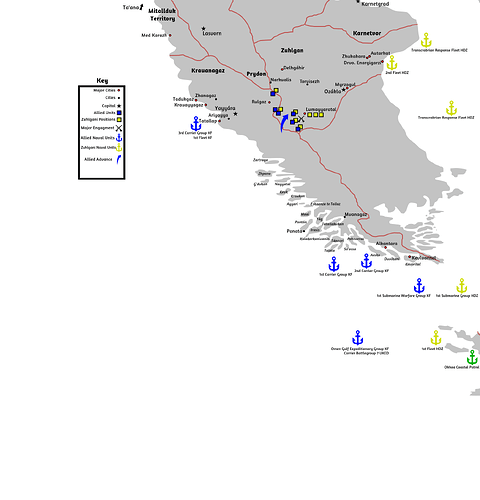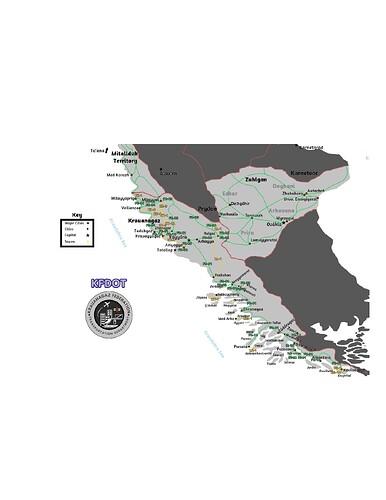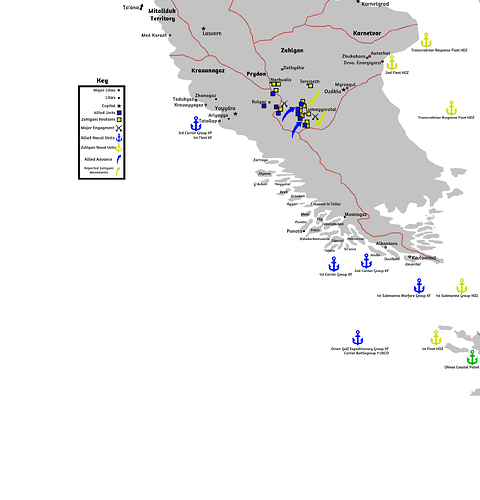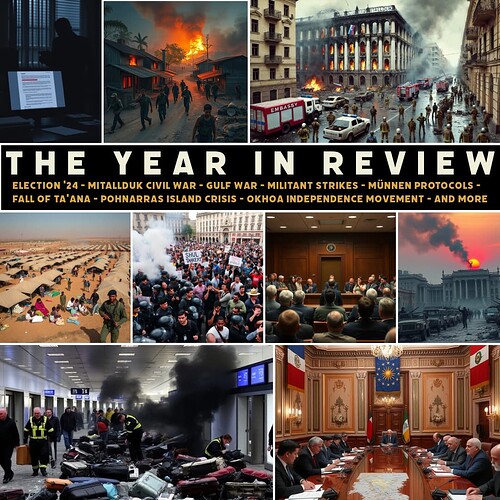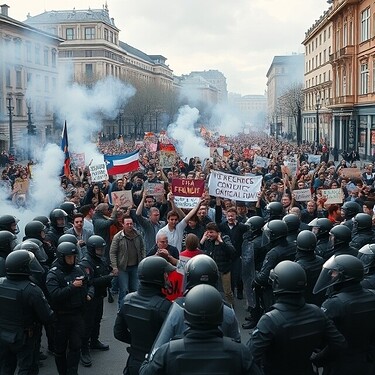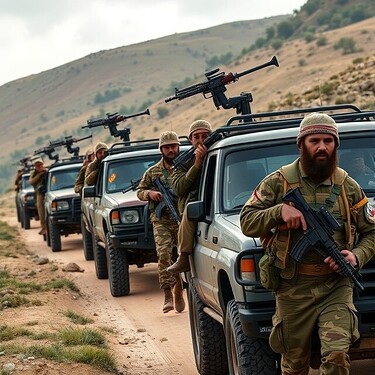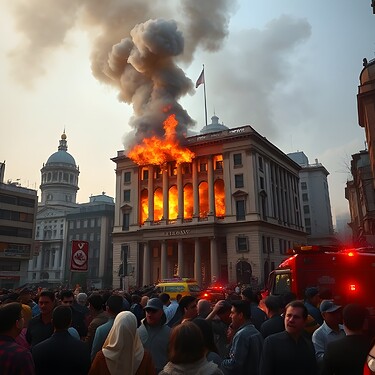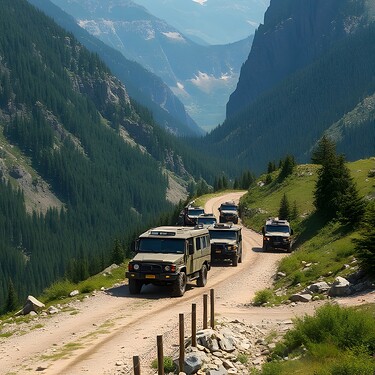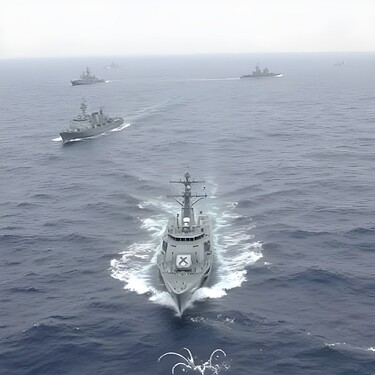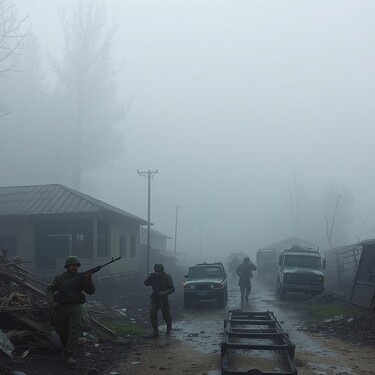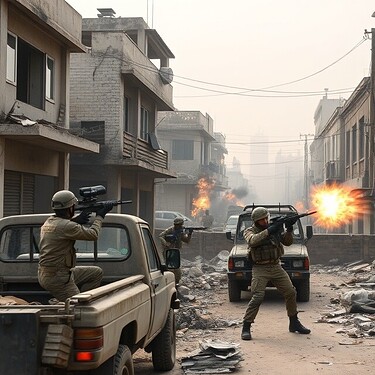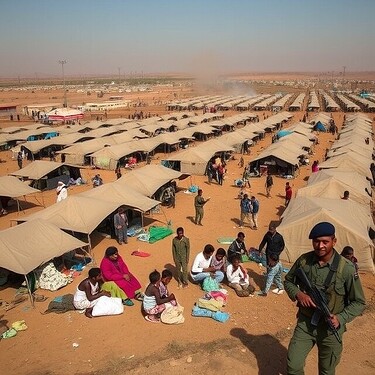The Year In Review
disss
A Tumultuous Year in Southern Cordilia
“2024 will be remembered as a year of upheaval in Krauanagaz and its neighboring regions, marked by violence, political turmoil, and a relentless struggle for stability.”
- KFN Editorial Board
2024 was a year of seismic change— both figuratively and, as scientists warn, potentially literally— for Krauanagaz and its neighbors. Marked by war, political upheaval, and deepening humanitarian crises, the past twelve months have left a deep scar on the region. The past year has seen Krauanagaz grappling with escalating militant violence, a contentious election cycle, and its entanglement in the brutal Gulf War. Simultaneously, the Mitallduk Confederacy plunged deeper into civil war, with ramifications rippling across Southern Cordilia. The intertwined conflicts and crises have forced the region to confront unprecedented challenges as it looks toward an uncertain future.
The Mitalldukish Civil War
Few conflicts in recent history have unfolded with such intensity as the Mitalldukish Civil War. Sparked by longstanding ethnic tensions, territorial disputes, and internal factionalism, the civil war escalated into full-scale conflict early in 2024. The Takaran People’s Army (TPA) and Purity Vanguard (PV) emerged as dominant forces, seizing control of key territories, including Mitallduk’s capital city of Ta’ana in July. Throughout the year, Krauanagaz and other regional actors, including Zuhlgan, sought to manage the fallout, but the war has left millions displaced and critical infrastructure in ruins.
Various factors contributed to the rapid consolidation of power by the Takaran People’s Army (TPA) and Purity Vanguard (PV). Following the arrest of five Mitallduk Defense Force (MDF) soldiers accused of killing four refugees—including two children—and injuring seven others in April, anti-government sentiment quickly proliferated throughout the nation. Large demonstrations erupted in many of Mitallduk’s major cities, including Ta’ana, with protesters criticizing the government’s response. The police’s use of tear gas and rubber bullets only heightened tensions, solidifying the demonstrators’ resolve. One Mitallarkava (head of state and government) candidate, Ya’oran Gallai, publicly supported the protests, claiming they were defending the “honor of our nation.”
dddddddssss
ddffdddddssss A large protest in Kevantza Square in Ta’ana, Mitallduk’s capital.
As the court-martial date for the accused soldiers approached, tensions escalated. Protesters—jeering anti-immigrant slogans and wielding signs supporting the accused soldiers— argued that the trial was a politically motivated act to appease international critics and Krauanagaz. Ya’oran Gallai framed the trial as another instance of a “weak government kowtowing to foreign interests.” The Barrier Islands Civil Liberties Union (BICLU) reported that between April 25 and May 20, Mitallduk National Police arrested over 28,000 individuals connected to the protests.
By May, demonstrations waned in frequency but retained underlying public support. On May 6, masked individuals, believed to be Gallai supporters, stormed the convention center where the Kevantza Mitalldukish (KM) party was holding its nomination convention. With the May 20 election approaching, civil unrest intensified, prompting the government to deploy MDF units nationwide to curb potential political violence during the early voting period and on election day.
The prolonged unrest and the government’s inability to maintain order emboldened tribal militias, such as the TPA and PV, which had existed for decades due to ethnic discrimination and disputes over land and governance. On the night of May 20, an explosion at Mitallduk’s Refugee Office in Ta’ana marked a turning point. The following day, Krauanagaz and numerous other nations lost contact with their diplomatic delegations in Mitallduk. According to Kraudukra Human Rights Watch (KHRW), militia forces killed hundreds of Krauanagazan and Lupritali refugees and forcibly expelled thousands more. A viral video showed refugees being brutalized and shot, capturing international outrage. One survivor, who escaped to Krauanagaz, described the violence: “The [militiamen] came in the middle of the night, shouting and firing their weapons. People were dragged out of their tents, beaten, and some were shot. It was pure terror.”
dddddddssss
ddddddbbbbdssss A convoy of TPA militants in Northern Mitallduk.
dddddddssss
dddddddddddddddddssss Aerial view of Ta’ana, 7 July 2024.
The Mitalldukish Civil War began as a fragmented insurgency but quickly evolved into a coordinated and devastating conflict as factions like the TPA and PV consolidated power. By mid-year, these groups had overthrown the Mitalldukish provisional government in key territories, culminating in the fall of Ta’ana on July 4. Fueled by a mix of internal divisions and external meddling, the war’s devastation has been widespread. While Krauanagaz and Zuhlgan initially sought to stabilize the region, their interventions ultimately exacerbated tensions, leading to their withdrawal under pressure from militia forces. Millions remain displaced, and the region faces a protracted humanitarian crisis.
Krauanagaz Militant Violence
Krauanagaz endured an unrelenting wave of militant attacks throughout 2024, plunging the nation into chaos as extremist groups like Red K and the Messengers of Tallaz escalated their campaigns of terror. High-profile incidents, such as the devastating Alkantara International Airport bombing in April and the coordinated embassy bombings in Mitallduk, underscored the increasing audacity and operational capacity of these groups. These attacks not only inflicted massive casualties but also targeted critical infrastructure, further destabilizing an already volatile region.
The January assassination attempt on Krauanaet Lyra Zharan underscored the precariousness of the nation’s leadership. While Zharan survived the attack unscathed, the incident revealed shocking lapses in the Krauanaet Protective Service’s ability to neutralize internal threats. The subsequent leak of KPS files later in the year implicating a Zuhlgani asylee in the assassination attempt plunged the administration into crisis. While raising pressing questions about national security, asylum policies, and the government’s transparency.
The Alkantara International Airport bombing in April marked a grim milestone in the year’s violence. Occurring during the peak travel season, the attack left over 200 dead and hundreds more injured. Investigators attributed the bombing to Red K, whose operatives managed to smuggle explosives past security checkpoints, exposing glaring vulnerabilities in the nation’s counterterrorism measures. The attack triggered widespread panic and prompted immediate calls for an overhaul of airport security protocols, though many critics argued that the government’s response was slow and insufficient.
Meanwhile, the embassy bombings in Mitallduk, occurring within a month of the airport attack, sent shockwaves through the international community. These attacks specifically targeted the Krauanagazan and Zuhlgani diplomatic missions in Ta’ana, killing hundreds of staff and civilians and straining the nation’s already fragile foreign relations. Red K claimed responsibility, citing perceived injustices against Krautali refugees as justification. These incidents further highlighted the porous security apparatus and deepened international and public frustration with the Zharan administration’s perceived inability to address the growing threats.
dddddddssss
The Zuhlgani embassy in Ta’ana, Mitallduk following a devastating Red K bombing in late February.
Compounding the crisis, the Federal Defense Intelligence Agency (FDIA) faced a damning, and ongoing, torture probe after reports surfaced of detainees being subjected to unlawful interrogations in secret facilities. The leaked reports detailed the use of unauthorized detention methods, systematic torture, and the silencing of dissent, drawing fierce condemnation from human rights groups and international watchdogs. The scandal, which has implicated high-ranking officials, including the agency’s former director, eroded public trust in the government and fueled opposition narratives of systemic corruption and overreach. Protesters across Krauanagaz demanded accountability, with demonstrations growing larger and more volatile as more details of the FDIA’s abuses came to light.
The fallout from these events reverberated across Krauanagaz, shaping both public opinion and policy debates. Opposition parties seized on the scandals to criticize the Zharan administration’s handling of national security and immigration. Right-wing factions called for sweeping restrictions on asylum seekers, particularly those from conflict regions like Zuhlgan, while civil rights groups warned against xenophobia and the erosion of democratic principles.
As 2024 drew to a close, Krauanagaz remained a nation on edge. The relentless militant attacks, combined with the political and social upheaval stemming from the FDIA probe and the assassination attempt, left the Zharan administration struggling to maintain stability. With national elections looming in November, the government faced mounting pressure to restore public confidence while navigating the intersecting crises that threatened to undermine the nation’s unity and security.
Amid the fallout, opposition parties and political factions seized on the turmoil to criticize Zharan’s administration for its perceived failure to address the rising tide of domestic and external threats. Calls for a comprehensive review of asylum protocols, tighter security measures, and increased scrutiny of Krauanagaz’s intelligence apparatus grew louder, reflecting growing public frustration with the nation’s inability to ensure safety and stability.
By the end of the year, Krauanagaz found itself not only battling militant groups on multiple fronts but also grappling with the growing polarization of its domestic politics. Anti-immigrant sentiment has surged, driven by fear and misinformation, further dividing an already fractured society. The Zharan administration, facing mounting criticism and dwindling public support, struggled to maintain a fragile unity as the nation teetered on the brink of greater unrest.
The Cordilian Crisis
Krauanagaz’s involvement in the Gulf War, following mounting tensions with Zuhlgan, has dominated headlines for much of the latter part of the year. The Gulf War, initially dubbed the Cordilian Crisis, escalated into a full-scale conflict on September 19, 2024, beginning one of the most volatile chapters in South Cordilian history.
Though tensions between the two South Cordilian nations had been simmering for years, the flashpoint followed a cascade of events in early September. The burgeoning conflict reached a fever pitch on September 1 following a Red K attack on a Krauanagazan navy ship at Omen Joint Naval Base that killed 30 sailors. Several days after, a leaked trove of classified documents was published that demonstrated irrefutable links between Zuhlgan and militant groups like Red K. These revelations not only fractured Red K internally, but also provided Krauanagaz and its allies with the justification to formally declare war on Zuhlgan.
The September 1 attack, Zuhlgani cyberattack on September 7, and an incident involving a Zuhlgani submarines harassing a Krauanagazan ships set the stage for the largest military mobilization the region has seen in decades. Krauanagaz declared war soon after the revelations of Zuhlgani interference in Krauanagaz aiming to curb Zuhlgan’s expanding influence.
The early weeks of the war saw bold military initiatives. Krauanagazan operations in Eastern Prira, a mountainous province of Zuhlgan, showcased Krauanagaz’s determination in disrupting Zuhlgani supply lines and dismantling extensive defensive networks. Despite initial success, the rugged terrain, harsh weather, and well-fortified Zuhlgani defenders turned these advances into a grinding stalemate. Heavy casualties among Krauanagazan troops and logistical challenges hampered momentum, and forced Krauanagaz to reevaluate its strategy.
dddddddssss
ds A convoy of Krauanagazan military vehicles navigating mountainous terrain in Western Prira.
In parallel, the Okhoa Protectorate, a Zuhlgani-administered territory, emerged as an unexpected but critical front. Zuhlgan has long accused Krauanagaz of covertly supporting the Okhoa Independence Party, a militant faction of the left-wing Okhoa United Congress which has multiple representatives on Okhoa’s governing council. Zuhlgan has claimed that Krauanagaz leverages diplomatic channels and supplies material aid to bolster resistance groups. In response to recent protests in Okhoa, Zuhlgan instituted sweeping military police crackdowns in the territory. Zuhlgan alleged the unrest was instigated by a Krauanagazan intelligence operative, and held large-scale naval exercises in the Gulf of Good Omen. The increased naval activity posed additional risks to Krauanagaz’s supply routes and further strained an already stressed economy.
dddddddssss
dddddfffffddssss Zuhlgani state media image of Zuhlgan’s naval exercises.
dddddddssss
jjkKrauanagazan soldiers patrolling the mountainside city of Narkualis in the Western Prira region.
The Gulf War has too exacted a devastating toll on civilians. Krauanagaz’s military campaigns, Zuhlgan’s aggressive tactics, and brutal militant fighting in Mitallduk and Krauanagaz displaced over 8.7 million people by September. Periodcally for the past 7 weeks, leaflets have fluttered in the air over Eastern Prira in preparation for what is expected to be a significant Krauanagazan operation. The leaflets urge residents in several regional languages to evacuate, warning that a large-scale operation is impending. However, weeks of harsh weather have slowed evacuation efforts and thousands remain trapped in active combat zones with limited, or no access to aid.
As the war drags on into 2025, new challenges have emerged to test Krauanagazan resolve. Zuhlgan’s economic and diplomatic maneuvering added more layers of complexity to the situation. The Transcrabrian Partnership with Nicholas and Great Britain (NaGB), finalized on Sept. 20, strengthened Zuhlgan’s economic position despite mounting international pressure, and sanctions. This alliance provided Zuhlgan with new trade opportunities and resources, and offered an economic cushion for Zuhlgan mitigating the impacts of the war and bolstering its military.
By late October, the Gulf War had devolved into a costly stalemate. Krauanagazan forces launched an invasion into Zuhlgan on October 7, focusing on the fortified mountain regions. While initial gains were made, progress has nearly slowed to a halt with heavy casualties and fierce Zuhlgani resistance. The battle of Lumayyaratal, beginning on October 14, symbolized the war’s brutality as both side have continuously committed significant resources and units to take this critical urban center. Despite Krauanagaz’s attempts to maintain unity at home, the strain of the war and militant attacks at home is evident in outgoing Krauanaet Zharan’s resounding defeat in November’s SNAP election. Economic pressures from the unprecedented refugee crisis, cyberattacks, and military spending have led to skyrocketing national debt and public discontent. Thalira Renkara’s strong victory in November is expected to dramatically reshape Krauanagaz’s political landscape.
dddddddssss
ss Krauanagazan forces engaging Zuhlgani military units in Western Lumayyaratal. (Dec. 9, 2024)
The Gulf War has fundamentally impacted Southern Cordilia, intensifying regional rivalries and exposing critical gaps in national security institutions. For Krauanagaz, the stakes remain high; Its territorial integrity, regional influence, and political stability hang in the balance. As the war drags into a new year, Krauanagaz finds itself navigating a narrow path between military aggression and diplomatic maneuvering to secure its future.
Krauanagaz & Mitallduk Elections
The snap election in Krauanagaz, prompted by a contentious vote both chambers of Ludoraiya, culminated in a dramatic runoff victory for Lupriari Thalira Renkara (SV). Her victory marked a seismic shift in Krauanagazan politics, with voters choosing a candidate who promised to prioritize the needs of citizens over entrenched political and military interests.
dddddddssss
Krauanaet-elect Renkara delivering her victory speech at Federation Stadium in Alkantara after the
dddddddddddddddddddddddffdddddssss runoff election.
The runoff election highlighted deep divisions within the electorate. Renkara’s strong grassroots campaign resonated with those disillusioned by the ongoing militant violence and Gulf War, while her opponent, Taaayya Lithin (LI), focused on reforming military oversight and pursuing measured accountability.
Voter turnout reach record levels, reflecting the high stakes of the election and the public desire for change. However, the election was not without controversy. Reports of heightened security measures, including the presence of provincial militia units at some polling stations, drew criticism from civil liberties organizations. Despite this, international observers deemed the election to be largely free and fair, bolstering its legitimacy on the global stage.
Renkara’s blowout victory signals a potential pivot in Krauanagaz’s domestic and foreign policies. Her platform emphasized reducing military spending, addressing economic inequality, and improving social services. However with a fractured Ludikiari and persistent militant threats, she faces significant challenges in enacting her agenda.
In Mitallduk, the elections were overshadowed by the civil war, which has decimated traditional governance structures and empowered militant factions like the Takaran People’s Army (TPA) and the Purity Vanguard (PV). The TPA and PV joined forces late in the year and the coalition has since dominated the political landscape, leveraging their military victories to consolidate power and control key regions.
In Krauanagaz, Renkara’s victory represents a desire for change but also highlights the deep divisions and challenges she will face in uniting the nation. While in Mitallduk, the growing dominance of militant factions reflects a dangerous erosion of democratic norms and the consolidation of power through force.
The Refugee Crisis
The year has been marked by an escalating humanitarian crisis as millions of people have been displaced by violence across Southern Cordilia. Refugee camps in Krauanagaz and surrounding regions have become overwhelmed, forcing aid organizations and local governments to confront an unparalleled challenge in meeting the basic needs of those affected.
The dual conflicts in Mitallduk and Krauanagaz have created a humanitarian catastrophe. By mid-year, over 8.7 million people had been displaced, with that number rapidly rising as violence persists. In Krauanagaz, refugee camps in provinces like Zhzoatal, Kevpríg, and Lutavaras Arkas have reached three to four times their capacity, while makeshift camps have sprung up in urban centers and border regions.
dddddddssss
dddddddsssswddddssssA refugee camp in Northern Krauanagaz.
Displacement has not been limited to Krauanagaz. Neighboring regions, including Zuhlgan, have also seen a surge in migrants seeking asylum. The sheer scale of the crisis has overwhelmed existing infrastructure, with many camps struggling to provide adequate shelter, food, and medical care. The collapse of infrastructure in conflict zones has compounded the humanitarian crisis. In Mitallduk, the destruction of roads, hospitals, and water systems has left hundreds of thousands without access to essential services. In Southern Krauanagaz, Zhulgani cyberattacks earlier in the year disrupted power grids and communications, worsening conditions for both refugees and aid workers.
According to Doctors Without Borders (NLL), health crises are emerging in overcrowded camps, with outbreaks of cholera and other waterborne illnesses reported. Aid organizations like the International Federation for Humanitarian Aid (IFHA) have warned that the lack of clean water and sanitation poses a grave threat to public health, particularly for vulnerable populations such as children and the elderly.
The Krauanagazan government has struggled to manage the influx of refugees while maintaining domestic stability. Under Krauanaet Lyra Zharan, the Federation established the Emergency Refugee Assistance Program (ERAP) earlier this year, allocating funds for temporary housing and healthcare in heavily impacted provinces. However, critics argue that the program has been underfunded and poorly coordinated, leaving many refugees without adequate support. Local communities have stepped in where federal efforts have fallen short, with volunteer networks providing food and clothing to displaced families. Yet, these grassroots efforts cannot meet the overwhelming demand, and tensions between refugees and local populations have begun to surface in some areas.
The international community’s response to the crisis has been inconsistent. While nations like Emerald and Huawan have pledged financial support, significant gaps in funding remain. The World Forum’s humanitarian arm has launched several appeals for aid, but bureaucratic delays and political disagreements have hindered coordination. Regional actors such as Zuhlgan have faced criticism for their role in perpetuating the conflicts that have driven displacement. However, Zuhlgan has also provided limited aid to affected areas within Mitallduk and Krauanagaz.
As 2024 draws to a close, the humanitarian crises in Krauanagaz and Mitallduk remain dire. The incoming administration of Thalira Renkara has pledged to prioritize Refugee assistance and rebuild the nation’s capacity to manage the influx. However, with limited resources and ongoing conflicts, the road to recovery will be long.



